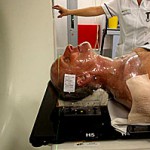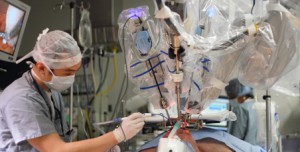
- Swelling or sore that does not heal (the most common symptom)
- Red or white patch in the mouth
- Lump, bump, or mass in the head or neck area (with or without pain)
- Persistent sore throat
- Foul mouth odor not explained by hygiene
- Hoarseness or change in voice
- Nasal obstruction or persistent nasal congestion
- Frequent nose bleeds and/or unusual nasal discharge
- Difficulty breathing
- Double vision
- Numbness or weakness of a body part in the head and neck region
- Pain or difficulty chewing, swallowing, or moving the jaws or tongue
- Ear and/or jaw pain
- Blood in the saliva or phlegm (mucus discharged in mouth from respiratory passages)
- Loosening of teeth
- Dentures that no longer fit
- Unexplained weight loss
People who notice any warning signs should talk with a doctor and/or dentist right away. Your doctor will ask you questions about the symptoms you are experiencing to help find out the cause of the problem, called a diagnosis.
Because many of these symptoms can be caused by other, noncancerous health conditions, as well, it is important to receive regular health and dental screenings. This is particularly important for people who routinely drink alcohol or currently use tobacco products or have used them in the past.
In fact, people who use alcohol or tobacco should receive a general screening examination at least once a year. This is a simple, quick procedure in which the doctor looks in the nose, mouth, and throat for abnormalities and feels for lumps in the neck. If anything unusual is found, the doctor will recommend a more extensive examination using one or more of the procedures mentioned in the Diagnosis section.
If cancer is diagnosed, relieving symptoms and side effects remains an important part of cancer care and treatment. This may also be called symptom management, palliative care, or supportive care. Be sure to talk with your health care team about symptoms you experience, including any new symptoms or a change in symptoms.
Treatment of Head and Neck Cancer in India

- Excision. This is an operation to remove the cancerous tissue and the margin around it.
- Laser Technology. This may be used to treat early-stage tumors, especially in larynx cancer.
- Lymph Node Dissection. If the doctor suspects that the cancer has spread, the doctor may remove lymph nodes in the neck, possibly causing stiffness in the shoulders afterward. This may be done at the same time as an excision.
- Reconstructive (Plastic) Surgery. This type of operation is aimed at restoring a person’s appearance and function of the affected area. If the surgery requires major tissue removal (for example, removing the jaw, skin, pharynx, or tongue), reconstructive or plastic surgery may be done to replace the missing tissue.
Minimally Invasive Surgery for Head and Neck Cancer at World Class Hospitals in India

Endoscopic Laser Surgery: This technique may be used to remove tumors in the larynx (voice box) or pharynx (throat) while preserving the structures involved in speech and swallowing. The surgeon inserts a thin, lighted tube called an endoscope through the patient’s mouth and into the throat. Surgeons remove the tumor using a special laser that is attached to the endoscope. Endoscopic laser surgery is often performed on an outpatient basis with a safe, fast-acting anesthetic that wears off quickly after the procedure.
Minimally Invasive Video-Assisted Thyroidectomy (MIVAT): A tiny video camera that is attached to an endoscope is used to remove thyroid tumors through a small incision.
Robotic Surgery: Tumors of the tongue and tonsils can be removed with the aid of small robotic arms that are placed in the mouth, avoiding the need to make a large incision or to split the jawbone.
To know more about Head and Neck Cancer Treatment in India please visit this link : https://safemedtrip.com/medical-services/cancer-treatment-in-india/head-and-neck-cancer-treatment-in-india.html

 Click to WhatsApp
Click to WhatsApp +91-9899993637
+91-9899993637



